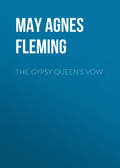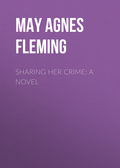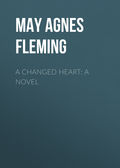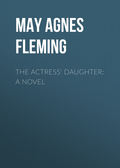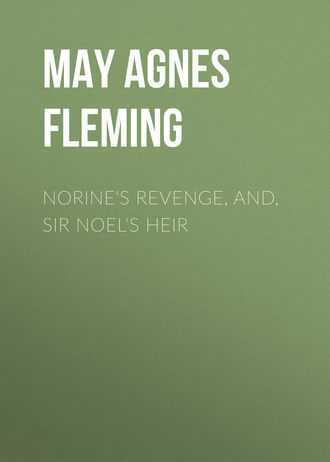
May Agnes Fleming
Norine's Revenge, and, Sir Noel's Heir
CHAPTER XXIII.
"JENNIE KISSED ME."
It is a bright but chilly May day. In the luxurious sitting-room of Mrs. Liston-Darcy a coal fire is burning, and in a purple arm-chair before this genial fire Mrs. Darcy sits.
She is looking very handsome as she sits here, the brilliant morning sunshine streaming across her dusk beauty and loosely-rippling hair – very handsome in her rose-pink wrapper, with a soft drift of lace about the slim throat and wrists. Very handsome, and yet a trifle out of sorts, too; for the dark, slender brows are contracted, and the brown, luminous eyes gaze sombrely enough into the depths of the fire. She sits looping and unlooping in a nervous sort of restlessness the cord and tassels that bind her slender waist, one slippered foot beating an impatient tattoo on the hassock, her lips compressed in deep and unpleasant thought. About the room, great trunks half-packed stand; in the wardrobe adjoining, her maid is busily folding away dresses. Evidently an exodus is at hand.
"I cannot go – I shall not go until I see him," she is thinking; "it is only what I have richly earned, what my treachery of the past deserves, but it is none the less hard to bear. I cast off his love once, trampled his heart under my feet; he would be less than man to offer it again to one so treacherous and unworthy. And Nellie is an angel – who can wonder that he loves her? It is my just punishment when I have learned how good, how tender, how noble he is, to see her win him from me – when I have learned to love him with my whole heart, to see him give his to her – to lose him in my turn."
She rises with an impatient sigh and walks up and down the room, trying to crush out the bitter pain of loss – the envy and rebellion that will arise within her as she thinks of Helen Thorndyke the wife of Richard Gilbert.
For it has come to this – that society begins to whisper Helen will speedily doff the weeds of widowhood for the pale flowing robes of the bride.
It is the second May following Laurence Thorndyke's tragic death, one year and seven months have passed, and the most despairing of widows will not despair forever. For the last half-year, in a quiet way, Helen has been going out a good deal, and is very much admired. And yet no wife had ever grieved more deeply, passionately and truly than Helen Thorndyke in the first dark months following her husband's death. Remorse had added poignancy to her natural grief and horror of his dreadful end, and she had suffered how greatly, only Helen herself will ever know. But that is nearly two years ago, and Helen is but four-and-twenty, and
"Time, that blunts the edge of things,
Dries our tears and spoils our bliss."
Time had brought its balm to her, and she could eat, drink and be merry once more. A great peace has followed that tragic time, friends surround her, and foremost and warmest among them, Richard Gilbert.
In the little cottage, presented her by Norine, where Helen and her little ones dwelt, the lawyer was a very frequent visitor. When Mrs. Thorndyke's doors closed to all others they opened to him. And there Mrs. Darcy, a daily comer, met him at least two or three times each week. It had been her wish, after Laurence Thorndyke's death, that the stricken young widow should still make her home in her house, but this Helen had refused. She wanted to be alone, to hide herself somewhere away from all eyes, and Norine had understood the feeling, and gifted her with the pretty, vine-covered cottage outside the city's noise and turmoil. There, with her babies, Helen dragged through those first miserable months, and lived down her first bitter agony of remorseful despair.
When the summer, with its fierce, beating sunshine came they left the city's scorched streets and sun-bleached parks, for the cool breezes and country sweetness of Kent Hill. Thither Richard Gilbert, by invitation, followed. The close intimacy between him and Helen never waned. The children clung to him, and crowed with delight at his coming. He seemed never to weary of their small society. Was it altogether for all their own, or a little for their mother's sake, Norine wondered, feeling her first sharp, jealous pangs. He spent a month with them, then went back. And when September, cool and delicious, came refreshingly to New York, the two handsome young widows, with the two little children, followed. In society that winter, Mrs. Liston-Darcy, the millionaire's heiress, was admired enormously. Not alone, for her bank stock; for her own bonnie black eyes and rare piquant loveliness. Many men bowed down before her, younger, handsomer, more famous men than Richard Gilbert, but her answer was to one and all the same. None of these men touched her heart, to none of them was she inclined to tell the story of her own dark past. It was a bond between herself, and Helen, and Mr. Gilbert. In spite of herself she had learned to love him, to know him, to value him. She turned her wistful eyes to his face, but those dark, lustrous looks had fooled him once – he was not the man to make himself any woman's puppet, and dance as she pulled the strings. He saw nothing but that she was rich, far beyond all riches of his, more beautiful with every passing year, surrounded by young and handsome men, ready to marry her at any moment. She had flung him off, unable to love him years ago. Was it likely that old, and gray, and grim, she could care for him now? He laughed, in a dreary sort of mockery, at the bare thought. Love and marriage had gone out of his life forever; he must be content with Helen's trust and friendship, until some more favored man bore her off, too, with her children; until they also outgrew childish loves. That the world coupled his name with hers, in that way, he absolutely never dreamed.
Another May had come, and Norine, wearied of it all, and full of nameless restlessness, took a sudden resolution. She would go abroad. In travel she would find change and peace, and when Helen became his wife she, at least, would not be here to see it.
As she walked up and down, deep in her own somber thoughts, the boudoir door opened, and Helen herself came in – she was passing these last days with her friend – came in looking tall and stately, and very fair in her trailing black dress, and most becoming widow's cap.
"Mr. Gilbert has come, Nory," she says. "Will you go down or shall he come up?"
A lovely rose pink flushes into Norine's face. She keeps it averted from Helen as she replies:
"It doesn't matter, does it?" with elaborate carelessness; "he may as well come up. I wish to speak to him on legal business. Susan, you may go for the present."
So Susan goes, and Mrs. Thorndyke returns to the drawing-room and tells Mr. Gilbert, Norine will see him up-stairs. He goes up stairs, and appears presently before the mistress of the house, rather paler than usual if she did but notice it.
"Good-morning, Mr. Gilbert," she says, coming forward with outstretched hand and a smile. "I heard from Liston you had returned to town, and sent for you at once. I hope you enjoyed your trip to Baltimore?"
"As much as one usually enjoys a flying visit, forced upon one at a most inopportune time. I went to make a will. What is this Nellie tells me? You are going to Europe?"
"Going to Europe. I am a restless, dissatisfied sort of mortal, I begin to think – never so happy as when on the wing. Mr. Darcy's death cut short my continental tour before; I shall make a prolonged one this time."
He was very grave and pale; even she noted the pallor now.
"You are looking ill," she said, drawing closer to him; "there is nothing the matter, I hope?"
"Nothing, thank you. How long do you propose remaining away?"
"Three years at the least."
There was a moment's silence. Norine broke it.
"You said just now your trip to Baltimore was to make a will. I sent for you this morning on that same errand; I am going to make my will."
He lifted his eyes and looked at her.
"Your will!" he repeated.
"My will. No, don't look anxious, dear friend; I don't think I am going to die. Only, when one intends to spend three years upon steamers and express trains, one may as well be on the safe side. If anything should happen, it is well to be able to give an account of one's stewardship. I want to provide for Helen and the children. Helen may not need any help of mine" – the steady, sweet tones shook a little – "but it belongs of right to the children. Once it was to have been all their father's. I shall only be giving them back what is rightly theirs. I wish to leave all I have to them. To-morrow, Mr. Gilbert, if you are not busy, I will go to your office and make my will."
Then there was a long, strange pause. In her own room adjoining, Helen Thorndyke sang softly as she moved about. The sweet, soft words came clearly to them as they stood there:
"Jenny kissed me when we met,
Jumping from the chair she sat in.
Time, you thief! who loved to get
Sweets into your list, put that in.
Say I'm weary, say I'm sad,
Say that health and wealth have missed me.
Say I'm growing old, but add —
Jenny kissed me!"
Mr. Gilbert was the first to break the spell of silence.
"You are quite right," he said. "It can do no harm, only – it will be trouble taken for nothing. You will pass unscathed the fiery ordeal of steamers and express trains, and," with a smile, "one day you will marry again and make to-morrow's legal work null and void."
"I will never marry."
She said it gravely, and a little coldly. He was watching her – her eyes were steadfastly fixed upon the fire.
"Never marry?" he echoed, still smiling. "What will the honorable member from Ohio say to that?"
"You allude to Mr. More, I suppose," she said, still coldly. "I am aware gossip has coupled our names, and gossip is about as correct in this instance as it usually is."
"You are not engaged to him, then!"
"I am engaged to no one. I care nothing for Mr. More, in the way you mean. Even if I did, I still would not dream of marrying him."
"And why not?"
"Why not? You ask me that – you who know the cruel, shameful story of my past, the story I should have to tell."
"You were far more sinned against than sinning, and you have atoned."
She looked up suddenly – a swift flash of light in her eyes.
"Mr. Gilbert! You say that! If I could only think so, only hope I had atoned!"
"You have indeed. I say it with all my heart. Your revenge has been a noble one. You have blest and brightened the life of Helen and her children. For him – he wrought his doom with his own hand! You have atoned."
"To Helen and her children – perhaps yes," she said, her voice broken and low; "but the greatest wrong of all was not done to them. Years ago I sinned against you, beyond all forgiveness. The remorse of my life is for that. You did me so much honor, you trusted me so entirely, and I – ah! what a wretch I must have been in your eyes, what a wretch I must be still."
He arose to his feet, moved beyond all power of silence now.
"Must be still," he repeated. "Norine! why do you make me say this? I love and honor you beyond all women."
She gave a low cry, and stood with her hands clasped together.
"I never thought to say it – you force it from me in self-defence. I loved you then – I love you now. You have never ceased for one instant to hold your place in my heart. It is folly, I know, but folly you will not laugh at. If you wronged me, Norine – and you have – I forgive you freely, utterly, and I pray Heaven to make you happy in the love of some happier man."
She stood spell-bound – the shock of surprise was so utter, but over her face a great joy was breaking.
"And Helen?" she gasped.
"Helen?" he looked at her in wonder.
"Did you not know – can it be possible that – Mr. Gilbert, the world says Helen is to be your wife!"
His look of amaze and consternation was so great that she laughed outright – Norine's own sweet, soft laugh.
"Good Heaven!" he said. "What preposterous nonsense! Why, only yesterday Helen was urging me to speak to you – the very folly I am guilty of to-day. She was absurd enough to imagine I had still a chance left. I speedily convinced her of the contrary."
"Did you?" Norine said, a roguish smile dimpling the pretty mouth. "But then Mr. Gilbert is famous as a special pleader, and poor Nellie is so weakly credulous. I don't believe you would find it so easy to convince me."
"Norine!" he stood still, his face pale, his eyes startled, "for pity's sake what is it you mean? Don't let me hope only to fool me again! I – I couldn't bear that!"
She came forward, both hands eloquently outstretched, a smile quivering on her lips, tears in the dusk, lovely eyes.
"Richard, see! I love you with all my heart – I have loved you for years. Let me atone for the past – let me keep the plight I broke so long ago – let me be your wife. Life can hold no happiness half so great as that for me!"
And then, as he folded her in his arms close to the heart that would shelter her forever, Helen's happy voice came borne to them where they stood.
"Say I'm weary, say I'm sad,
Say that health and wealth have missed me;
Say I'm growing old, but add —
Jenny kissed me!"
SIR NOEL'S HEIR
CHAPTER I.
SIR NOEL'S DEATH BED
The December night had closed in wet and wild around Thetford Towers. It stood down in the low ground, smothered in trees, a tall gaunt, hoary pile of gray stone, all peaks, and gables, and stacks of chimneys, and rook-infested turrets. A queer, massive, old house, built in the days of James the First, by Sir Hugo Thetford, the first baronet of the name, and as staunch and strong now as then.
The December day had been overcast and gloomy, but the December night was stormy and wild. The wind worried and wailed through the tossing trees with whistling moans and shrieks that were desolately human, and made one think of the sobbing banshee of Irish legends. Far away the mighty voice of the stormy sea mingled its hoarse bass, and the rain lashed the windows in long, slanting lines. A desolate night, and a desolate scene without; more desolate still within, for on his bed, this tempestuous winter night, the last of the Thetford baronets lay dying.
Through the driving wind and lashing rain, a groom galloped along the high road to the village at break-neck speed. His errand was to Dr. Gale, the village surgeon, which gentleman he found just preparing to go to bed.
"For God's sake, doctor," cried the man, white as a sheet, "come with me at once. Sir Noel's killed!"
Dr. Gale, albeit phlegmatic, staggered back, and stared at the speaker aghast.
"What? Sir Noel killed?"
"We're afraid so, doctor; none of us know for certain sure, but he lies there like a dead man. Come, quick, for the love of goodness, if you want to do any service!"
"I'll be with you in five minutes," said the doctor, leaving the room to order his horse, and don his hat and great coat.
Dr. Gale was as good as his word. In less than ten minutes he and the groom were flying recklessly along to Thetford Towers.
"How did it happen?" asked the doctor, hardly able to speak for the furious pace at which they were going. "I thought he was at Lady Stokestone's ball."
"He did go," replied the groom; "leastways he took my lady there; but said he had a friend to meet from London at the Royal George to-night, and he rode back. We don't, none of us, know how it happened; for a better or surer rider than Sir Noel there ain't in Devonshire; but Diana must have slipped and threw him. She came galloping in by herself about half an hour ago, all blown; and me and three more set off to look for Sir Noel. We found him about twenty yards from the gates, lying on his face in the mud, and as stiff and cold as if he was dead."
"And you brought him home and came for me?"
"Directly, sir. Some wanted to send word to my lady, but Mrs. Hilliard, she thought how you had best see him first, sir, so's we'd know what danger he was really in before alarming her ladyship."
"Quite right, William. Let us trust it may not be serious. Had Sir Noel been – I mean, I suppose he had been dining.
"Well, doctor," said William, "Arneaud, that's his valey de chambre, you know, said he thought he had taken more wine than prudent going to Lady Stokestone's ball, which her ladyship is very particular about such, you know, sir."
"Ah! that accounts," said the doctor, thoughtfully; "and now, William, my man, don't let's talk any more, for I feel completely blown already."
Ten minutes' sharp riding brought them to the great entrance gates of Thetford Towers. An old woman came out of a little lodge, built in the huge masonry, to admit them, and they dashed up the long winding avenue under the surging oaks and chestnuts. Five minutes more, and Dr. Gale was running up a polished staircase of black, and slippery oak, down an equally wide and black and slippery passage, and into the chamber where Sir Noel lay.
A grand and stately chamber, lofty, dark, and wainscoted, where the wax-candles made luminous clouds in the darkness, and the wood-fire on the marble hearth failed to give heat. The oak floor was overlaid with Persian rugs; the windows were draped in green velvet; and the chairs were upholstered in the same. Near the centre of the apartment stood the bed, tall, broad, quaintly carved, curtained in green damask, and on it, cold and apparently lifeless, lay the wounded man. Mrs. Hilliard, the housekeeper, sat beside him; and Arneaud, the Swiss valet, with a frightened face, stood near the fire.
"Very shocking business this, Mrs. Hilliard," said the doctor, removing his hat and gloves – "very shocking. How is he? Any signs of consciousness yet?"
"None whatever, sir," replied the housekeeper, rising. "I am so thankful you have come. We, none of us, knew what to do for him; and it is dreadful to see him lying there like that."
She moved away, leaving the doctor to his examination. Ten minutes, fifteen, twenty passed; then Dr. Gale turned to her with a very grave face.
"It is too late, Mrs. Hilliard. Sir Noel is a dead man."
"Dead!" repeated Mrs. Hilliard, trembling, and holding by a chair. "Oh, my lady! my lady!"
"I am going to bleed him," said the doctor, "to restore consciousness. He may last until morning. Send for Lady Thetford at once."
Arneaud started up. Mrs. Hilliard looked at him, wringing her hands.
"Break it gently, Arneaud. Oh, my lady! my dear lady! so young, and so pretty – and only married five months!"
The swiss valet left the room. Dr. Gale got out his lancet, and desired Mrs. Hilliard to hold the basin. At first the blood refused to flow – but presently it came in a little feeble stream. The closed eyelids fluttered; there was a restless movement, and Sir Noel Thetford opened his eyes on this mortal life once more. He looked first at the doctor, grave and pale, then at the housekeeper, sobbing on her knees by the bed. He was a young man of seven-and-twenty, fair and handsome, as it was in the nature of the Thetfords to be.
"What is it?" he faintly asked. "What is the matter?"
"You are hurt, Sir Noel," the doctor answered, sadly; "you have been thrown from your horse. Don't attempt to move – you are not able."
"I remember – I remember," said the young man, a gleam of recollection lighting up his ghastly face. "Diana slipped, and I was thrown. How long ago is that?"
"About an hour."
"And I am hurt? Badly?"
He fixed his eyes with a powerful look on the doctor's face, and that good man shrunk away from the news he must tell.
"Badly?" reiterated the young baronet, in a peremptory tone, that told all of his nature. "Ah! you won't speak, I see. I am, and I feel – I feel – Doctor, am I going to die?"
He asked the question with wildness – a sudden horror of death, half starting up in bed. Still the doctor did not speak; still Mrs. Hilliard's suppressed sobs echoed in the stillness of the vast room.
Sir Noel Thetford fell back on his pillow, a shadow as ghastly and awful as death itself, lying on his face. But he was a brave man, and the descendant of a fearless race, and except for one convulsive throe that shook him from head to foot, nothing told his horror of his sudden fate. There was a weird pause. Sir Noel lay staring straight at the oaken wall, his bloodless face awful in its intensity of hidden feeling. Rain and wind outside rose higher and higher, and beat clamorously at the windows; and still above them, mighty and terrible, rose the far-off voice of the ceaseless sea.
The doctor was the first to speak, in hushed and awe-struck tones.
"My dear Sir Noel, the time is short, and I can do little or nothing. Shall I send for the Rev. Mr. Knight?"
The dying eyes turned upon him with a steady gaze.
"How long have I to live? I want the truth."
"Sir Noel, it is very hard, yet it must be Heaven's will. But a few hours, I fear."
"So soon?" said the dying man. "I did not think – Send for Lady Thetford," he cried, wildly, half raising himself again – "send for Lady Thetford at once!"
"We have sent for her," said the doctor; "she will be here very soon. But the clergyman, Sir Noel – the clergyman. Shall we not send for him?"
"No!" said Sir Noel, sharply. "What do I want of a clergyman? Leave me, both of you. Stay, you can give me something, Gale, to keep up my strength to the last? I shall need it. Now go. I want to see no one but Lady Thetford."
"My lady has come," cried Mrs. Hilliard, starting to her feet; and at the same moment the door was opened by Arneaud, and a lady in a sparkling ball-dress swept in. She stood for a moment on the threshold, looking from face to face with a bewildered air.
She was very young – scarcely twenty, and unmistakably beautiful. Taller than common, willowy and slight, with great, dark eyes, flowing dark curls, and a colorless olive skin. The darkly handsome face, with pride in every feature, was blanched now almost to the hue of the dying man's; but that glittering bride-like figure, with its misty point-lace and blazing diamonds, seemed in strange contradiction to the idea of death.
"My lady! my lady!" cried Mrs. Hilliard, with a suppressed sob, moving near her.
The deep, dark eyes turned upon her for an instant, then wandered back to the bed; but she never moved.
"Ada," said Sir Noel, faintly, "come here. The rest of you go. I want no one but my wife."
The graceful figure, in its shining robes and jewels moved over and dropped on its knees by his side. The other three quitted the room and closed the door. Husband and wife were alone with only death to overhear.
"Ada, my poor girl, only five months a wife – it is very hard on you; but it seems I must go. I have a great deal to say to you that I can't die without saying. I have been a villain, Ada – the greatest villain on earth to you."
She had not spoken – she did not speak. She knelt beside him, white and still, looking and listening with strange calm. There was a sort of white horror in her face, but very little of the despairing grief one would naturally look for in the dying man's wife.
"I don't ask you to forgive me, Ada – I have wronged you too deeply for that; but I loved you so dearly – so dearly! Oh, my God! what a lost and cruel wretch I have been!"
He lay panting and gasping for breath. There was a draught which Dr. Gale had left standing near, and he made a motion for it. She held it to his lips, and he drank; her hand was unsteady and spilled it, but still she never spoke.
"I cannot speak loudly, Ada," he said, in a husky whisper, "my strength seems to grow less every moment; but I want you to promise me before I begin my story that you will do what I ask. Promise! promise!"
He grasped her wrist and glared at her almost fiercely.
"Promise!" he reiterated. "Promise! promise!"
"I promise," she said, with white lips.
"May Heaven deal with you, Ada Thetford, as you keep that promise. Listen now."
The wild night wore on. The cries of the wind in the trees grew louder and wilder and more desolate. The rain beat against the curtained glass; the candles guttered and flared; the wood-fire flickered and died out. And still, while hour after hour passed, Ada, Lady Thetford, in her lace and silk and jewels, knelt beside her young husband, and listened to the dark and shameful story he had to tell. She never once faltered, she never spoke nor stirred; but her face was whiter than her dress, and her great dark eyes dilated with a horror too intense for words.
The voice of the dying man sank lower and lower – it fell to a dull, choking whisper at last.
"You have heard all," he said, huskily.
"All?"
The word dropped from her lips like ice – the frozen look of blank horror never left her face.
"And you will keep your promise?"
"Yes."
"God bless you! I can die now. Oh, Ada! I cannot ask you to forgive me; but I love you so much – so much! Kiss me once, Ada, before I go."
His voice failed even with the words. Lady Thetford bent down and kissed him, but her lips were as cold and white as his own.
They were the last words Sir Noel Thetford ever spoke. The restless sea was sullenly ebbing, and the soul of the man was floating away with it. The gray, chill light of a new day was dawning over the Devonshire fields, rainy and raw, and with its first pale ray the soul of Noel Thetford, baronet, left the earth forever.
An hour later, Mrs. Hilliard and Dr. Gale ventured to enter. They had rapped again and again; but there had been no response, and alarmed they had come in. Stark and rigid already lay what was mortal of the Lord of Thetford Towers; and still on her knees, with that frozen look on her face, knelt his living wife.
"My lady! my lady!" cried Mrs. Hilliard, her tears falling like rain. "Oh! my dear lady, come away!"
She looked up; then again at the marble form on the bed, and, without word or cry, slipped back in the old housekeeper's arms in a dead faint.



